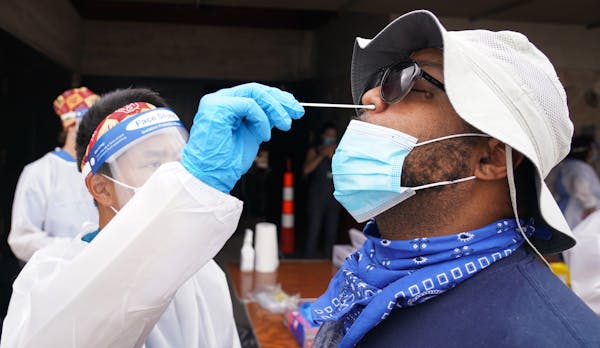Republican lawmakers on Monday urged Gov. Tim Walz to "reassess the tone and approach" as state regulators step up enforcement of mask-wearing and social distancing at bars and restaurants to reduce the spread of the coronavirus.
A letter signed by House GOP Leader Kurt Daudt and more than 50 other Republican lawmakers accused the DFL governor of unfairly targeting the hospitality industry as his administration increases its oversight of health mandates imposed in the COVID-19 pandemic.
The letter follows a separate public missive from Senate Republican Leader Paul Gazelka on Friday challenging a possible extension in September of Walz's emergency powers under the pandemic. "There is no longer an emergency," Gazelka said.
The letters come as hospitalizations and death numbers have leveled off somewhat in the state, although daily case growth has risen in recent days, fueled in part by healthier teenagers and young adults.
As Minnesota struggles to keep COVID-19 cases down, state officials have increased monitoring to ensure businesses are complying with the DFL governor's executive orders. But Walz's tactics to combat the spread of the coronavirus continue to trouble GOP legislators who worry that they place undue burdens on small businesses.
Fifty-two Republican representatives signed a letter saying they are concerned about a "threatening tone" from the state as it deploys investigators to ensure establishments follow rules on social distancing, employee health screenings and operating at 50% of capacity. Violators have been notified they can incur fines, lose liquor licenses or face closure. The GOP lawmakers allege that is a departure from a previous "educational" approach to compliance checks.
"Instead, you are weaponizing state agencies and threatening businesses with fines, closure and investigations at a time when so many are struggling just to keep their doors open," the Republicans wrote.
Walz said on Friday that a few businesses that aren't following the rules could hurt other bars and restaurants, as well as schools and communities that are trying to do things right.
"I would just ask businesses, just follow the rules, follow along. We are cognizant of the inconvenience it's been," Walz said, noting that there doesn't seem to be COVID-19 transmission in places that are following health guidelines. "We want those businesses to thrive, and what we don't want is a few to shut down the whole thing."
Minnesota Department of Health Commissioner Jan Malcolm said Monday the state is taking a "targeted approach" to increased compliance checks based on businesses where there have been complaints, as well as conducting random checks around the state. Infectious Disease Director Kris Ehresmann said 55 bars and restaurants have had cases associated with them — and those establishments have been tied to 1,286 cases of COVID-19. "That is concerning," she said, but both she and Malcolm stressed that the vast majority of businesses are following state guidance.
Gazelka, the state's top Republican, called on Walz to produce a set of criteria to determine when he will end the state's peacetime emergency status. The peacetime emergency has been in place for more than 165 days, and Minnesotans don't have a clear idea of when it will end, Gazelka wrote Friday.
"Our state has beat all COVID modeling expectations and deserves to be told when the excessive use of executive authority will cease," he said.
Walz's spokesman Teddy Tschann said in a statement Monday that like the federal government and every other state in the nation, "Governor Walz intends to recognize the pandemic as an emergency so long as it poses a public health threat to Minnesotans."
Republicans repeatedly voted to end the emergency order during a series of special legislative sessions over the summer. The Democratic-controlled House has blocked each of those attempts, arguing the governor's quick action is crucial.
Walz is expected to continue the emergency declaration, likely prompting another debate over his powers during a special session in mid-September. That session could also feature a showdown over some of Walz's picks for commissioners who lead state agencies.
In August, the GOP Senate voted out Department of Labor and Industry Commissioner Nancy Leppink, citing concerns about her approach to businesses during the pandemic as one reason for removal. They have since held a series of hearings with other state agency officials.

Want to share info with the Star Tribune? How to do it securely

'Safe recovery sites' would offer syringes, naloxone and more to people using drugs. The plan could be in peril.
New Minnesota GOP leaders seek peace with party's anti-establishment wing

Who is Republican Lisa Demuth, Minnesota's first House speaker of color?

